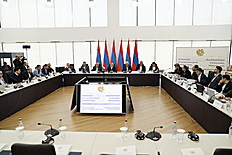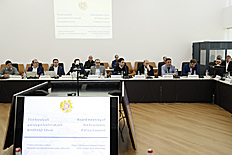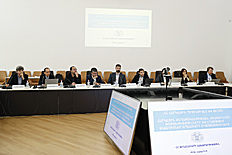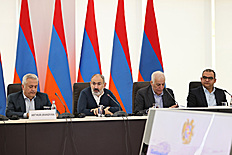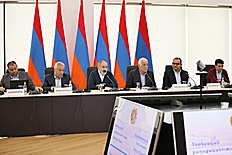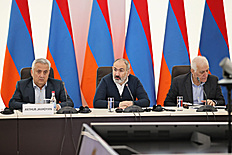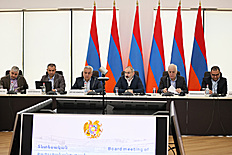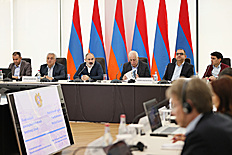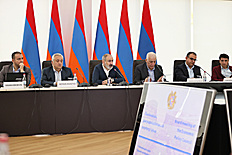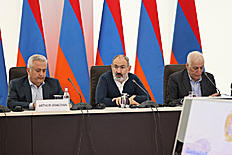Press releases
In 2022, compared to 2017, state budget tax revenues increased by more than 2 billion USD. the work of the second session of the Economic Policy Council under the Prime Minister has started
more 7 photos
Chaired by Prime Minister Nikol Pashinyan, the work of the second session of the Economic Policy Council under the Prime Minister started today in Dilijan, which will take place on April 15-16 at the Dilijan Research Center of the Central Bank of Armenia.
The President of the Republic Vahagn Khachaturyan, Deputy Prime Minister Tigran Khachatryan, Vice Chairman of the Economic Policy Council, Chairman of the Board of Trustees of "Economic Prospects Center-Foundation" Artur Javadyan, Minister of Economy Vahan Kerobyan, Minister of Finance Vahe Hovhannisyan, President of the Central Bank Martin Galstyan, President of the State Revenue Committee Rustam Badasyan, Minister in charge of Industry and Agriculture of the Eurasian Economic Commission Artak Kamalyan, President of the "Armenian Economic Union" NGO Gurgen Aslanyan, Member of the Centre for European Economic Research Zareh Asatryan, Professor Levon Barseghyan of Cornell University, USA, Professor Ruben Yenikolopov of the New Economic School in Russia, Vladimir Asriyan, professor of Barcelona School of Economics, representatives of the standing committees of the National Assembly on financial, credit and budget issues, as well as economic issues, the Deputy Ministers of Economy and Finance, other officials participate in the session.
At the beginning of the session, Prime Minister Pashinyan made an opening speech, in which he particularly said,
"Honorable President of the Republic of Armenia,
Dear members of the Economic Policy Council,
Dear Colleagues,
We start our second session of the Economic Policy Council. The first session took place last year and I would like to summarize the results we have recorded since that session, what we have to touch upon that is directly related to our topic.
According to the results of 2022, the Republic of Armenia recorded 12.6 percent economic growth, and by this indicator, as it turned out recently from the publications of international organizations, the Republic of Armenia is the 4th in the world, which is a very important indicator. I would like to mention a few more important figures.
In 2022, compared to 2017, state budget tax revenues increased by more than 2 billion USD or 66.3 percent, compared to 2018 by 1.8 billion USD or 53 percent, which is also a very important indicator, including from the point of view of our political commitments.
In December 2022, we recorded the highest ever index of registered jobs in the Republic of Armenia - 704 thousand jobs were recorded, and according to the results of 2022, we had 13 percent unemployment, which is a significantly low indicator for the last decade, and in the third quarter, unemployment decreased and reached 11.6 percent.
We must note that the results of the first quarter of 2023 are also encouraging, we continue the double-digit economic growth. The economic activity index for the first quarter is above 10 percent, and state budget revenues have essentially doubled compared to the first quarter of 2017, and increased by 92 percent compared to the first quarter of 2018, excluding income tax refunds. Taking that refund into account, budget revenues of the first quarter actually increased by 97 percent.
Of course, we have challenges of a purely economic nature with these indicators, and I think that the primary task for the government is, first, to collect tax revenues more efficiently, and it is equally important to spend efficiently. Unfortunately, we cannot say that, for example, in the area of capital expenditures, we have achieved the efficiency we expected, and in this respect, of course, it is very important to be able to reach certain conclusions based on the results of our discussions. Although I must say that it is a subject of almost weekly, if not daily, discussions for the government.
Of course, considering the challenges facing our country, we must record the key role of the economy and economic development, because when we talk about the economy, in fact, we must record what results we are able to generate. As a result of spending as effectively as possible, we should be able to address the challenges our country is facing.
And today we also have important topics related to institutional development on the agenda, particularly related to health insurance and the universal declaration system, which we believe will have a very important effect not only in terms of economy, but also in terms of establishing social, political and state institutions. For this reason, it is essential that we manage to implement the planned and started reforms as effectively as possible."
During the session, reference was made to the tax policy, the realization of the existing potential, the implementation of additional income-providing measures, the improvement of the tax-GDP ratio, the existing problems and their short-term and long-term solutions. Topics related to the planned changes within the framework of the tax policy, tax reforms and possible sources of increasing tax revenues were discussed.
Next, issues related to the introduction of the income declaration system for individuals became the subject of discussion. It was noted that the introduction of a simple and convenient system of declaration of income of individuals will provide all the information available for self-declaration in the system of the State Revenue Committee. The introduction schedule and requirements of the system were presented.
Reference was made to the possibilities of introducing new modern technologies in the State Revenue Committee and the work to be carried out in that direction.
Reference was made to the possibilities of introducing modern technologies in the State Revenue Committee and the work to be carried out in that direction.
The next item on the agenda was the work carried out in the direction of introducing comprehensive health insurance. In that context, the main challenges of the population's health, increasing the effectiveness of the government's annual health expenditures, problems related to the services provided to citizens and their solutions were addressed. It was noted that the introduction of the system envisages provision of health services to the population, development of human capital and support for solving demographic problems, protection of vulnerable groups, promotion of employment and increase of labor productivity, provision of a more convenient and predictable environment for investments.
In the event of the introduction of the system, it is also expected to introduce an integrated disease management mechanism, change the licensing conditions, set a single package of basic services, increase by several times the volume of prevention, diagnosis and supervision of chronic diseases, introduce a system for reimbursement of medication for chronic outpatiens, and implement measures to improve the quality of medical care.
The work of the session of the Economic Council under the Prime Minister will continue on April 16.
